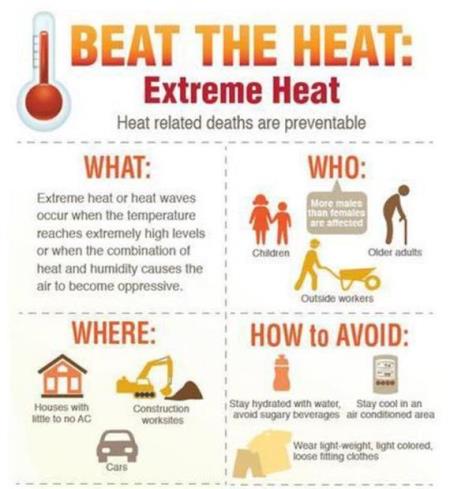Extreme Heat Preparedness Information
Extreme heat is a dangerous condition that occurs most frequently during the summer, but can occur at any time. Extreme heat is defined as a long period (2 to 3 days) of high heat and/or humidity that is well above the average temperature for the season and location. Extreme heat is very dangerous. During periods of high heat, evaporation slows down and the body must work harder than normal to maintain a normal temperature. Overheating and over stressing the body can lead to injury, illness, or death.

Outdoor Activity Guidance
The Spokane Regional Health District provides guidance for outdoor activities during periods of extreme heat. Please reference this information to help plan for and adjust outdoor activities during hot weather.
Prepare for Extreme Heat
Take time now to prepare for extreme heat emergencies:
- Find places around our community where you can keep cool
- Make alternate plans to move outdoor activities inside
- Find alternative locations for pets who stay outdoors
- Keep your work or study environment cool by:
- Drawing curtains, shades, or blinds
- Ensure weather strips on doors or windows are in good condition
- Do not prop open doors and windows in air conditioned buildings
- Use fans and window air conditioners appropriately
- Minimize sources of extra heat such as multiple computers, monitors, televisions, etc.
- Take steps to keep your home or living environment cool
- Learn to recognize signs of heat illness at https://www.cdc.gov/disasters/extremeheat/warning.html
Be Safe During Extreme Heat
During extreme heat emergencies, take the following precautions:
- Never leave anyone (children, pets, or adults) in vehicles on warm days
- Move to air conditioned spaces when possible
- If you are outside, stay in the shade and wear a hat
- Wear loose, lightweight, light-colored clothing
- Use sun block
- Drink plenty of water and fluids to stay hydrated
- Avoid high energy activities
- Check on yourself and those around you and watch for signs of heat-related illness
Recognize & Respond to Extreme Heat Danger
- Listen to extreme heat warnings and advisories
- Pay attention to one another and show good stewardship of our community.
- If you see someone who may be experiencing a heat-related illness, get help!
More Information
The following resources provide additional preparedness and response information about extreme heat risks.